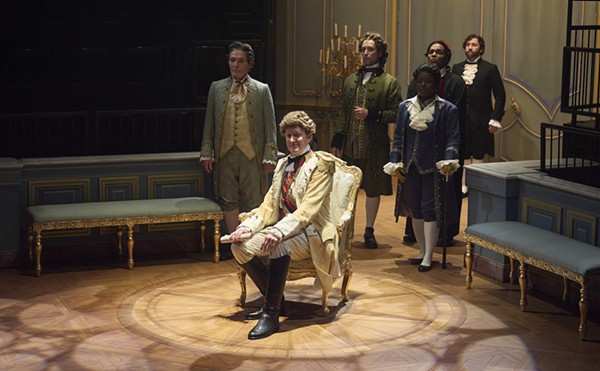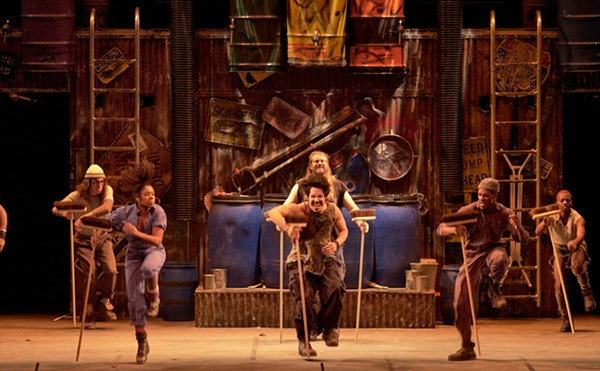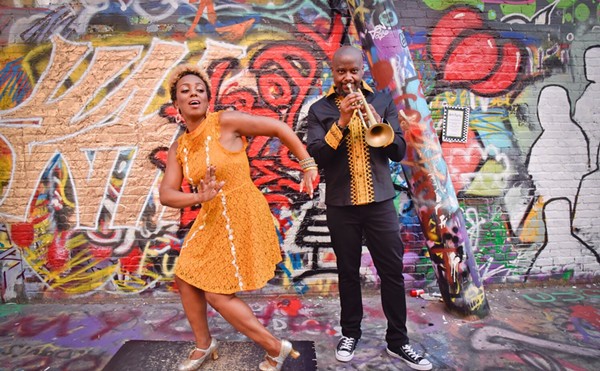Aficionados will not be disappointed; this is the Play House's happiest surprise in years. It exceeds expectations dramatically and musically. Unlike many musical bios of performers, Love, Janis illuminates rather than feeds off its subject. Built upon Joplin's letters and blazing musical reenactments, it avoids the hollow cliches that made the Allen Theatre's recent Jolson bland cardboard. It is a work of unexpected tenderness and infinite surprises, the happiest surprise being that it doesn't merely preach to fans--it gently guides and explains to the uninitiated.
My musical reveries of the '60s commence with the silver trill of Julie Andrews's flying nanny and culminate with Ann-Margret on a treadmill, bidding "bye-bye" to Conrad Birdie. Upon entering the Play House, half a dozen hearty inquiries about whether I was ready to rock and roll made my paranoia grow to formidable proportions. All for naught, it turned out.
Adapter/director Randall Myler is unerringly wise and true in his decisions. He eschews the path of shoddy fabrications. Even those who thought Joplin was some screaming shrew from another galaxy end up feeling as though she had become the girl next door. Instead of pop psychology bromides about '60s excesses or the curse of stardom, he plants the evening in the fertile field of Joplin's own words. Through Joplin's correspondence with her family, Myler vividly illustrates the escalating dichotomy between the public and private Janis.
Using a potent stage device, he divides the opposing sides of the conflicted singer between two actresses. The "private" Janis is played by Catherine Curtin. She is the insecure, Port Arthur, Texas refugee, and the perpetually affection-seeking daughter and sister.
Through her letters viewers experience her wonder as she leaves small-town America for San Francisco, and hear about the fascinating evolution from beatnik cool to hippie experimentation and rebellion. Then comes her tentative grasp on growing fame ("How can I be a star and have only $65 in the bank?").
There is a gentle, endearing na•vete as the ever-guilty daughter justifies her fire-engine approach to singing to her church choir-bred mama ("I have to save my pretty voice for Vegas"). Then there is the delightful irony of America's queen of counterculture confessing that she saw Pearl Bailey in Hello, Dolly! and liked it fine. Her growing loneliness is illustrated as she dotes over her dog and despairs over her one-night stands with weak, sycophantic fans ("The real men are in log cabins, chopping wood"). A gentle form of self-irony becomes apparent as she admonishes herself not to become a poor man's Cher. Next comes the need for more intense stimulation, the feathers, the psychedelic clothes, and the constant swigs of Southern Comfort ("I got them to pay me a whole lot of money for passing out").
Following in the tradition of self-imploding icons like Judy Garland and Billie Holiday, there is the grand flirtation with self-destruction ("They like to see their blues singers drunk and miserable"). There is the final denial ("Hendrix may be dead, but I'm a survivor"), and there is that inevitable headline flashed on a screen: JOPLIN DEAD AT 27 OF HEROIN OVERDOSE.
As the private Joplin, Curtin hauntingly resurrects the innocent-but-increasingly-hysterical singer as she evolves from fresh-faced cowgirl to liquor-besotted, sad-eyed fury.
If Curtin unearths the hidden little girl beneath the bell-bottoms and feathers, Beth Hart, an up-and-coming Los Angeles rock chanteuse, is utilized to evoke the public legend--the peacock feathers, the wailing blues singer skewing the bourgeoisie, pleading for a Mercedes-Benz. After the other Janis reads her letter, Hart strides center stage to enact the musical dragon obliterating '50s doo-wop ephemera and sexual hypocrisy. Hart performs twenty hard-driving blues numbers, filtering her own smokehouse voice through the trademark Joplin vocal acid. Between numbers she sits to the side, living the Joplin life, soaking up booze, toughening up before the audience's eyes, performing a symbiotic ritual with her private self. Together, the two Janises define themselves to a voice-over male interviewer.
Hart is no carbon copy of the real Joplin. She replaces the real singer's jungle ferocity with a strange, frightening, feral beauty. She is far sleeker and floats through her numbers like a water lily; she rocks by way of Martha Graham. As Streisand did in Funny Girl, she uses a former star's persona to shine forth her own magnetism. Her voice not only evokes Joplin but also simultaneously suggests the fierce majesty of Bessie Smith, the pain of Billie Holiday, and even some of Garland's neurotic vulnerability.
Backed by the funky, psychedelic light projections of Don Darnutzer and genuine Joplin cohort Sam Andrew's music direction, Joplin's twenty musical numbers are too fevered to count as mere re-creations; they are more akin to rebirth. An audience whose members were, for the most part, well past forty seemed to find their youth temporarily handed back to them amid the musical madness.
If the elements connecting the endearing dreamer, the naive country girl, and the self-destructing rock diva remain fuzzy, it still proves far more thrilling to have a truthful, tunneled look at an aspect of a legend than to be spoon-fed some pabulum-flavored lecture that presumes to tell all.
A double warning: Beth Hart will be alternating her forged-in-fire performance with Andra C. Mitrovich; and to all die-hard rockophobes, it may be months before you can mambo through your local CD emporium in search of the latest Peggy Lee or Dean Martin reissues without casting a tempted glance toward the Joplin section, wondering if perhaps a little "Me and Bobby McGee" will clear your sinuses and rev up your psyche.
Love, Janis, through April 4 at the Cleveland Play House, 8500 Euclid Avenue, 216-795-7000.











